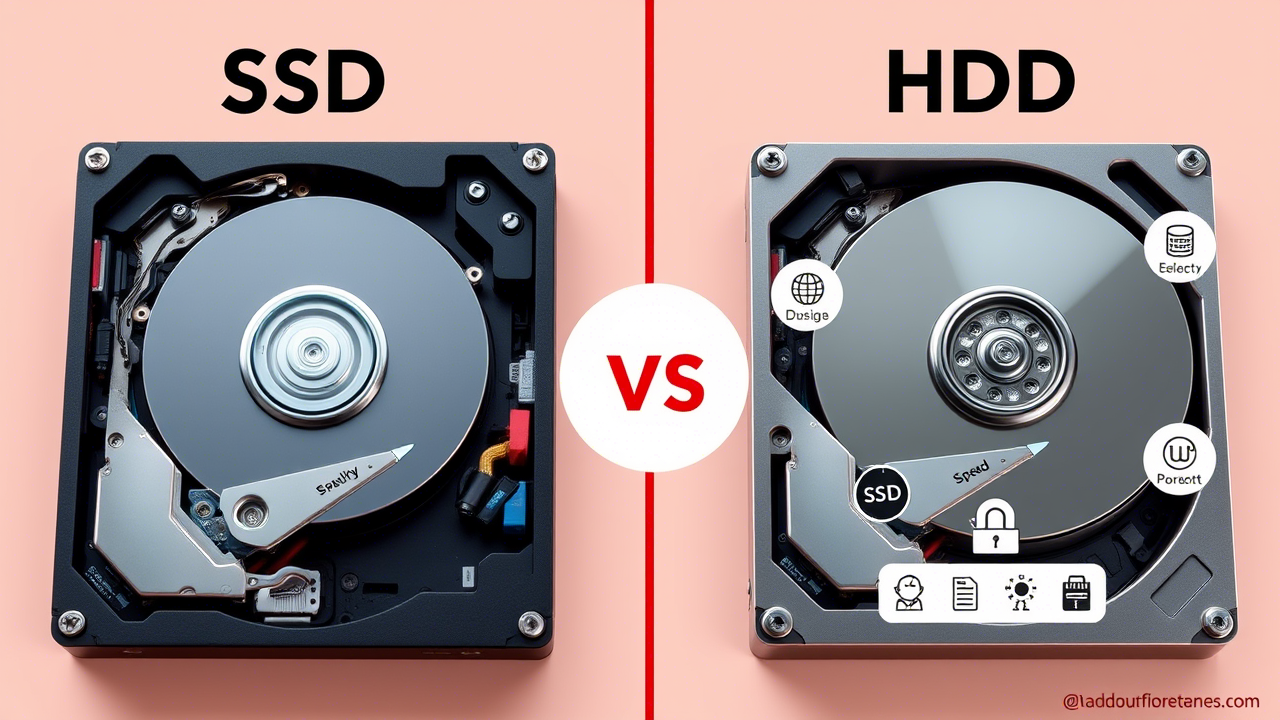Storage is a crucial component of any computer. Whether you’re building a gaming PC, a workstation, or a budget setup, choosing between an SSD (Solid State Drive) and an HDD (Hard Disk Drive) can significantly impact your system’s performance, speed, and reliability.
In this guide, we’ll compare SSD vs. HDD, their pros and cons, and help you decide which is best for your needs.

1. What is an HDD (Hard Disk Drive)?
An HDD (Hard Disk Drive) is a traditional storage device that has been used in computers for decades. It stores data on a spinning magnetic disk, with a mechanical arm reading and writing data.
How HDDs Work:
- A platter (spinning disk) stores the data.
- A read/write head moves over the disk to access information.
- The motor spins the platter at speeds like 5400 RPM or 7200 RPM.
Pros of HDDs:
✅ Cheaper per GB – You get more storage for less money.
✅ Higher Storage Capacities – HDDs are available in sizes up to 16TB or more.
✅ Great for Long-Term Storage – Ideal for storing large files, backups, and archives.
Cons of HDDs:
❌ Slower Performance – HDDs take longer to read and write data.
❌ More Fragile – The mechanical parts can break if dropped.
❌ Louder and Hotter – The moving parts create noise and heat.
Best Use Cases for HDDs:
✔️ Storing large files like movies, music, and backups.
✔️ Budget-friendly PC builds.
✔️ Secondary storage for non-essential files.
2. What is an SSD (Solid State Drive)?
An SSD (Solid State Drive) is a modern storage device that uses flash memory chips instead of spinning disks. This makes it much faster, more reliable, and quieter than an HDD.
How SSDs Work:
- Data is stored in flash memory cells (similar to USB drives).
- The drive reads and writes data electronically without moving parts.
- Information is accessed almost instantly.
Pros of SSDs:
✅ Blazing Fast Speeds – Up to 20x faster than HDDs.
✅ Instant Boot Times – Windows, macOS, and apps load in seconds.
✅ Silent Operation – No moving parts, so there’s no noise.
✅ More Durable – Resistant to drops, shocks, and vibrations.
✅ Lower Power Consumption – Extends laptop battery life.
Cons of SSDs:
❌ More Expensive per GB – Costs more than HDDs.
❌ Limited Write Cycles – Flash memory wears out over time (but lasts years in normal use).
Best Use Cases for SSDs:
✔️ Gaming PCs and Workstations – Faster loading times.
✔️ Laptops and Ultrabooks – Better performance and battery life.
✔️ Operating Systems and Software – Ideal for fast boot speeds.
3. SSD vs. HDD – Head-to-Head Comparison
| Feature | SSD (Solid State Drive) ✅ | HDD (Hard Disk Drive) 🛠 |
|---|---|---|
| Speed | Up to 5000 MB/s 🚀 | 80-160 MB/s 🐢 |
| Durability | No moving parts, shock-resistant 💪 | Fragile, mechanical parts ⚠️ |
| Noise | Completely silent 🔇 | Noisy spinning disks 🔊 |
| Power Usage | Low power consumption 🔋 | Higher energy use 🔥 |
| Storage Capacity | Usually up to 4TB | Up to 16TB+ |
| Lifespan | Long, but limited write cycles ⏳ | Longer lifespan for large storage |
| Cost per GB | More expensive 💰 | Cheaper 💲 |
4. Different Types of SSDs
Not all SSDs are the same! Here are the most common types:
1️⃣ SATA SSD (2.5-inch SSD)
- Speed: 500-600 MB/s (Much faster than HDDs).
- Pros: Affordable, easy to install in most PCs.
- Best For: Budget-friendly SSD upgrades.
2️⃣ NVMe SSD (M.2 SSD – PCIe 3.0 & 4.0)
- Speed: 3000-7000 MB/s (Blazing fast!).
- Pros: Ultra-fast speeds, ideal for gaming and professional work.
- Best For: High-performance builds (Gaming, Video Editing, 3D Design, etc.).
3️⃣ External SSD (USB & Thunderbolt SSDs)
- Speed: Varies (400MB/s – 2000MB/s).
- Pros: Portable and great for backups.
- Best For: Fast external storage for files, games, and video projects.
5. Which Storage Solution is Best for You?
🔹 Choose an SSD if:
- You want fast boot times and instant app loading.
- You need a responsive, quiet, and durable drive.
- You’re building a gaming PC, workstation, or laptop.
🔹 Choose an HDD if:
- You need a lot of storage for a lower cost.
- You want a secondary drive for backups or large files.
- You’re okay with slower speeds in exchange for more space.
💡 Best Setup? Use Both! 💡
For the best of both worlds, use:
✔️ SSD for OS and apps → Faster performance.
✔️ HDD for mass storage → More capacity at a lower price.
6. Recommended SSDs and HDDs for Your PC
🚀 Best SSDs (Fastest Performance!)
✔️ Samsung 980 Pro (NVMe SSD, PCIe 4.0) – Ultra-fast speeds up to 7000 MB/s.
✔️ WD Black SN850 (NVMe SSD, PCIe 4.0) – Great for gaming and professional workloads.
✔️ Crucial MX500 (SATA SSD) – Reliable and affordable 2.5-inch SSD.
💾 Best HDDs (High Storage Capacity!)
✔️ Seagate Barracuda 4TB – Reliable 7200 RPM HDD for everyday use.
✔️ WD Black 6TB – High-performance gaming HDD with faster speeds.
✔️ Toshiba X300 10TB – Ideal for massive file storage and backups.
7. Conclusion – SSD or HDD?
✅ For Speed & Performance → Go with an SSD!
✅ For Large & Cheap Storage → Go with an HDD!
✅ For the Best Setup → Use Both Together!
If you can afford it, an NVMe SSD for your operating system combined with an HDD for extra storage is the best way to get both speed and capacity. 🚀💾